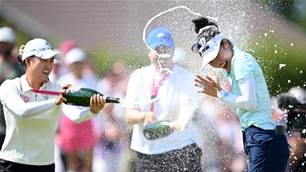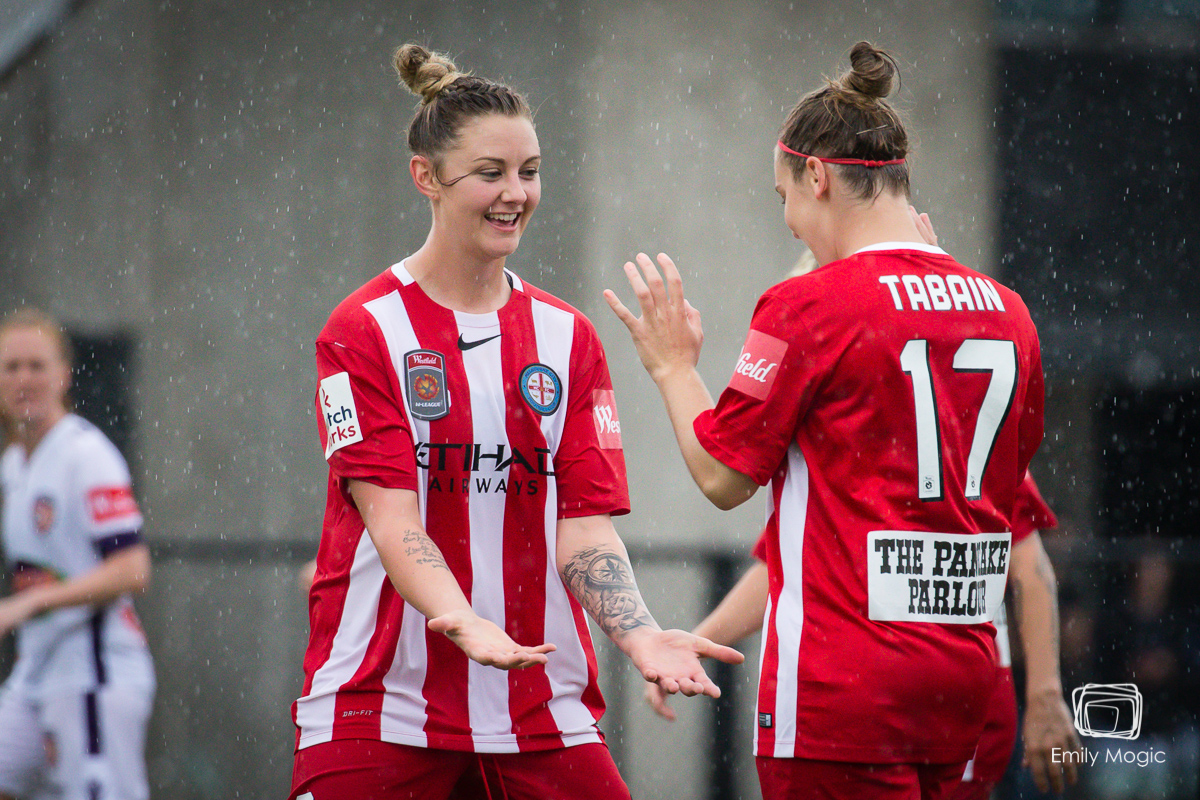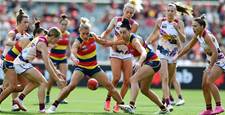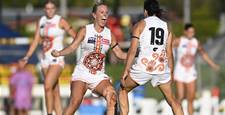Co-written with Jordan Lim from The Corner Flag
Co-written with Jordan Lim from The Corner Flag
“If you don't have confidence, you'll always find a way not to win.” – Carl Lewis
Melissa Barbieri, keeper and captain of Melbourne Victory, was sitting next to coach Dave Edmondson at the end of a 1-0 defeat to Newcastle Jets back in Round 3. They had just succumbed to their third loss in a row.
“I didn’t have much to do did I?” she said. “That’s a good indication of how well they’ve done in the backline, but there’s certainly things that we need to tidy up, especially in terms of backing ourselves.”
“Half the time it’s not the fact that we’re making mistakes, it’s the fact that we’re not backing ourselves in the tackle, going 100% into things. It’s not even that you’re making a mistake by doing the wrong thing, it’s just not committing 100% - that’s the downfall.”
“At 1-0, [we were] like ‘do we go, do we not?’, you’re in no man’s land and that’s where you get beat. If you’re going 100% at things, then you can pull something off because of the sheer determination. When you’re second guessing yourself - and that’s my job really.”
“My job is to remind the players how good they are continuously. I give them a bollocking now and then, but I have to remember that they’re young. They’re trying but they might just not be doing what I want them to at that exact same time.”
She paused. “The more I can instil in how good they are, then that shouldn’t happen. It’s a football thing, but it’s very much a women’s game thing.”
“Women’s football, instead of getting angrier and more frustrated, you start to go inside yourself and inside your shell.”
“In men’s football you see players arcing up and doing all sorts of things, getting red cards in the final minutes. Again, my job is to make sure they know how good they are and that they’re continuing to strive for that 100% every day.”
Perhaps it was because she steered the press conference somewhere unexpected that her comments struck a chord.
It made sense.
Barbieri has never shied away from addressing the bigger issues surrounding women’s sport. Barbieri has a rich history of the game at a national and international level, her initial break coming from the men’s leagues.
She presented some legitimate questions: how do players deal with confidence? Do women and men experience motivation and confidence in soccer differently? And what do these potential differences imply?
Sport is a context where people can develop self-esteem, self-assurance and confidence. It can also deplete these resources.
Gaylene Clews, sports psychologist, author of Wired To Play, places a lot of emphasis on this. “When you get the mental health right, you get improvement in performance. They go hand in hand.”
“When you have a young individual, we have to remember full brain development is not until mid twenties. We have a situation where our athletic prowess - our physical fitness, our strength and conditioning our skill acquisition - are travelling along at a faster rate than the psychological and emotional development of being a human being.”
“Individuals may not have the level of emotional well-being or maturity as they’re starting to improve in terms of performance. So the mental health side of it is actually really important. If it’s done well, you can speed up that learning curve.”
Introducing gender to the conversation complicates this.
Visible gaps still exist between men and women in sport. Traditionally sport - especially contact sport – has been associated with masculine qualities, like aggression. Football in Australia has been vastly dominated by men’s participation.
Despite a large increase in women playing football over the 1970s, and Australian women now signing themselves up in greater numbers than ever, women and girls are still playing sport at far lower rates than boys and men.
[More: Girls football participation hits all time high]
The examination of girls and boys highlight gendered habits are embedded from an early age. Even as young as four or five, there are noticeable differences in the forms of games and activities girls and boys choose to participate in on the playground.
If a girl can’t throw a ball, she isn’t shown by adults how to throw it properly: the activity is just made easier for her. This is benevolent sexism.
Several studies indicate that women drop out of organised sport at a younger age. Participation rates of girls and boys are similar up until they reach their teens. From there the participation rates decrease more rapidly for young women than young men.
Research suggests that the high dropout rates stem from sports conflicting with ideal representations of femininity because of their physical, aggressive side. Even at a professional level, there is more focus on meeting acceptable gender standards if your gender happens to be female.
Embedded and still vastly accepted, social attitudes often tell young women and girls that sports are not a natural rite for them as it is for boys. It feels odd to discuss this point on a website that covers female athletes who are living proof that women can play sport. However, the fact that you’re reading this probably indicates you’re aware that women’s sport is consistently undervalued.
Pervasive gender stereotypes could be just one area where women’s confidence affects their performance on the field. Research across many fields demonstrate a link between self-confidence and the willingness for individuals to compete.
Furthermore, those who have experienced competition are more likely to enter competitive environments again. Young women who do play sport experience higher levels of self-esteem and are more likely to continue physical activity into adulthood.
Gender, Clews acknowledges, definitely does complicate matters. “There’s some research to indicate that there are differences when you looked at sporting participation.
“They’ve found that men are more the competitive side and women were more the social affiliation. And that’s interesting because that’s very much paralleled today with technology use.”
“Females are more likely to use the social side of technology, the social networking. Males are much more prevalent in computer game playing, so that competitive side again.”
“I think it would be tricky to take a broad gender preference because I think it’s a lot more complicated. Obviously there are a lot of female athletes who are very keen on the competition side. And you get a lot of male athletes where social affiliation is a very important part of it.”
“I think it’s more relevant to be looking at personality temperaments. You’ve got about ten personality temperaments and they’re all very different. For some of those, the social component will be more important.
“Some of those, perfectionism and self-focused competition side is more important. So I’d be looking for those differences within genders, rather than across genders.”
Whilst this piece is left with more questions than answers, it can conclusively be said that the topic of confidence and gender is complex.
What started as an initial quote, spiking curiosity, resulted in uncovering only the tip of the iceberg on a huge topic. However, there is plenty of discussion to be had; both on sports psychology and women’s participation in soccer and the connections between the two.
"Wired To Play", by Gaylene Clews, is available for sale here. The book tackles the subject of athlete mental health in detail, providing practical information on how to identify and address issues for your best performance.
Related Articles

Column: Back-to-Back and Better Than Ever

The Aussies at the U.S Women’s Open














